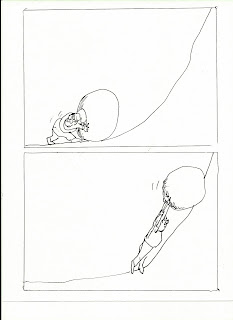
I do the grocery shopping at our house. This morning I was pushing the cart down the personal hygiene products aisle. I remembered I needed shaving stuff. I looked at the shavers that you buy and add blades to, but they were too expensive. I checked the disposable shavers. I looked at Schick, BIC, and Gillette. Some came in packages of three for around $5.00, there were some that came in packages of 5 and 10 for around that same $5.00ish price. The bulk disposable razors had thin handles, but a razor is a razor, right? Then I spotted the store brand. Those were made with an ugly mustard colored plastic for the handle, but there they were in a clear bag, 10 for $1.99.
Now after putting up the groceries I got in a hot tub. I shave in the tub. I have to sit in the tub and let it fill. If I fill first, at my size, I get in, and the water gets out.
I know most guys buy shaving cream in an aerosol can, or some shaving gel that comes out like tooth paste but as you rub it on your face it foams up. Those products seem too expensive for me. I use hand soap, soap up my face and use the Braille method of shaving. I run the blade across my face, and then feel for escapee whiskers, soap them up again, and scrape at the whiskery spots until I no longer feel the hair stumps.
The under chin area is always a problem, especially as I age and have the beginnings of a turkey neck. That’s when it happened. I cut my throat. It wasn’t a nick, it was a slice and a long slice as for as shaving wounds go. When I applied my generic store brand aftershave (sold by the quart) I made a face that the Home Alone kid would have admired.
Now I contemplated these events and asked myself a critical question: Why was I shaving without shaving cream, using the cheapest razor money can buy? When I buy razors for my wife I buy one of those Venus vibrating razors.
As I press a wad of toilet tissue against my bleeding throat I realize that I think my wife deserves the best, and I deserve nothing, and since I need to shave to look semi normal, I reluctantly buy the cheapest crap possible. These bulk bag cheap-o razors had the words Safety Razor on the packaging, but there was not much safety present with these things.
The cheap disposable razors I buy are a outward and visible sign of an inner and utter conviction that I am not worth it, not worth a good razor, not worth the big piece of chicken, not worth name brand shoes or pants or anything else. Perhaps I bled so much I came too and realized that I don’t value myself.
"Nobody can make you feel inferior without your
permission."
Eleanor Roosevelt
How can we know if we undervalue ourselves?
Ask these questions and then answer them honestly, ruthlessly. Don’t answer YES or NO because that doesn’t show degree. Use answers like Never, Occasionally, Often or Always.
1. How often do I feel a dislike of myself ?
2. How often do I think I am inadequate when compared with other people?
3. How often do I feel shy?
4. How often do I feel a lack of confidence?
5. How often do I feel as if my opinions don’t matter to other people?
6. How often do I feel as if I don’t deserve to be happy?
7. How often do I feel like other people dislike me?
8. If I do well at something how often do I call it “dumb luck” rather that feeling pleased with myself?
9. When I make a mistake how often do I believe that it is all my own fault?
10. How often do I find it difficult to say, “NO!”
11. Is it hard for me to accept criticism?
12. Is it hard for me to give honest criticism to other people right to their face?
If your answers indicate that you undervalue yourself, or hate yourself, well, you are a member of the LOW SELF ESTEEM CLUB.
Maybe the first step toward building up your esteem is to go out and buy yourself the most expensive gold plated shaver, and an expensive brand of shaving cream with aloe, because your face deserves the very best.











